A AFOGAR-SE EM MENTIRAS
04.10.2024

Uma deusa do mar a afogar-se em gás natural liquefeito1Com uma parede de chamas e um grupo de misteriosos representantes da indústria do petróleo e do gás, a Ocean Rebellion cria um quadro assustador de dor para realçar a lavagem verde da Gás Natural Liquefeito (GNL) por SEA-LNG e alguns Estados-Membros da Organização Marítima Internacional das Nações Unidas (IMO).
Juntamente com o Memorial Internacional aos Marítimos no Albert Embankment, os nossos artistas revelaram uma nova e impressionante performance destinada a esclarecer a grave crise que afecta a indústria naval.
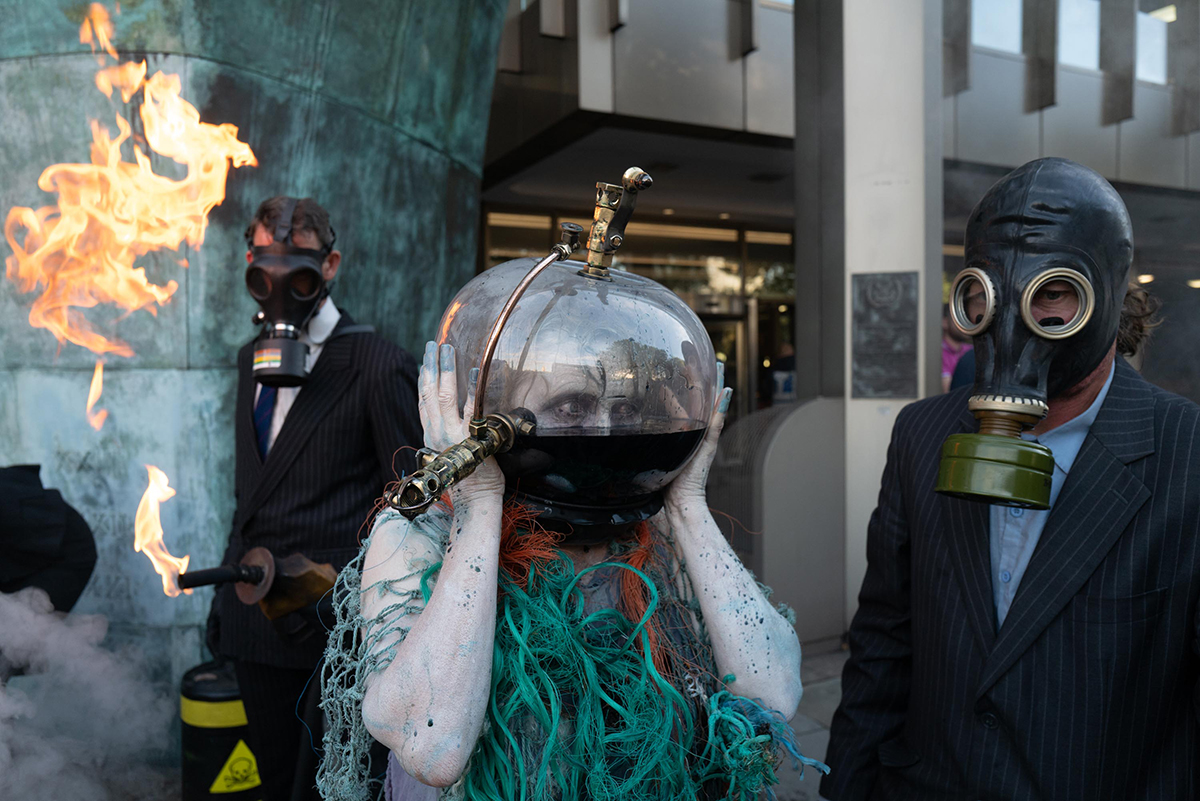
⬆️ À medida que o capacete se enche, a Deusa morre. As mentiras sujas do GNL estão a fazer com que a OMI caia num autoestrada para o inferno. Foto João Daniel Pereira.
A peça central do espetáculo foi o "afogamento" de uma deusa oceânica, a sua cabeça capturada dentro de um capacete translúcido, uma prisão em forma de aquário que se enche lentamente de morte. Figuras com máscaras de gás de Shell LNG, membro da SEA-LNG, O navio foi enchido com maquinaria para encher lentamente o capacete com GNL, submergindo-o. De ambos os lados, jactos de chamas e petróleo irrompiam de bicos empunhados pelos executivos da Oil and Gas. A atuação culminou com a submersão completa da deusa - uma acusação ao fracasso da OMI em proteger os oceanos, à sua manipulação contínua pela indústria dos combustíveis fósseis e da navegação, e um prelúdio pungente para o último dia da MEPC82 reuniões.
O destino do Oceano depende de todos nós.
As nossas intervenções dependem do seu apoio.
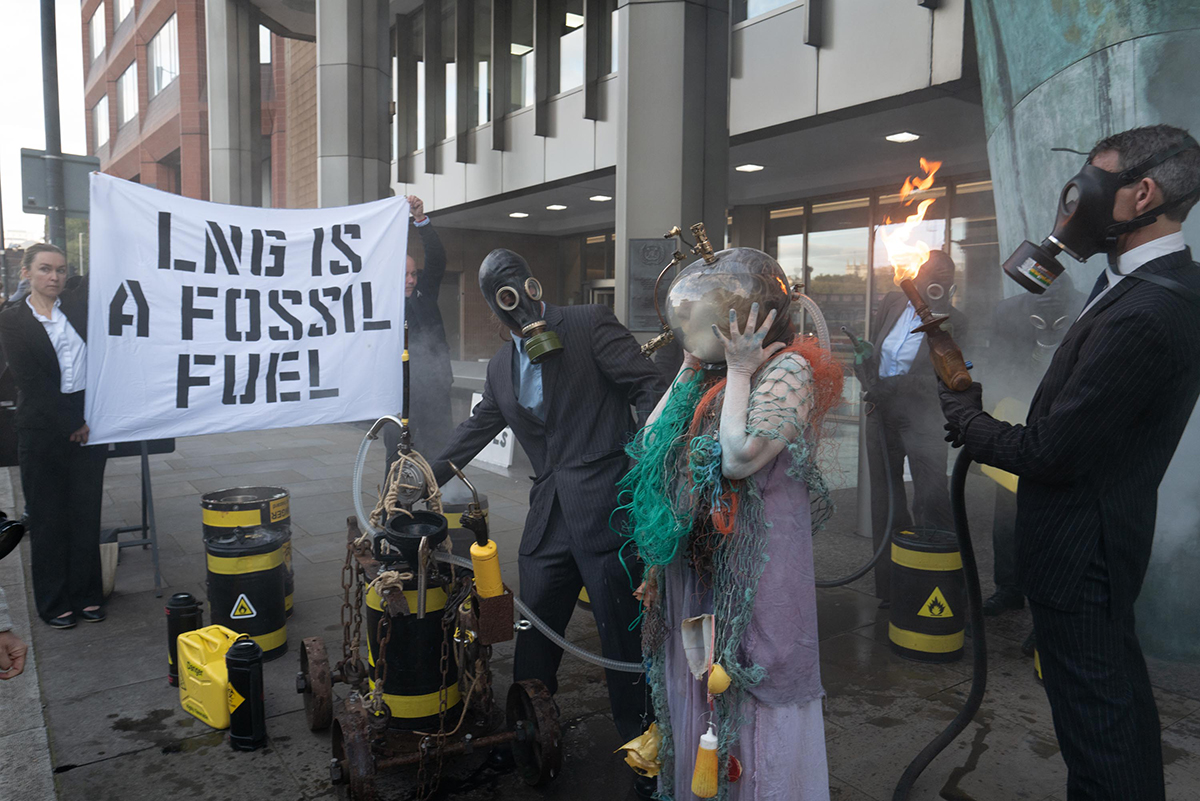
⬆️ O GNL é um combustível fóssil, é tão simples quanto isso. Foto João Daniel Pereira.
Escondendo-se atrás de relatórios sobre bioLNG, SEA LNG tem sido muito bem sucedido na venda de GNL como um combustível verde, apesar de o bioLNG ser caro e raro (o que significa que o GNL fóssil é o gás de eleição) e ainda causar emissões de metano em todo o seu cadeia de abastecimento e utilização.
O seu sucesso foi tão grande que empresas como Maersk, Royal Caribbeane MSC foram promoção dos seus navios como "verdes" e vendem esta mentira ao público em geral. O GNL não é um combustível ecológico. Além disso, a OMI está convencida desta mentira e não está a fazer nada para impedir que o GNL se torne o combustível fóssil de eleição para o transporte marítimo. Só na União Europeia, o consumo de GNL pelos navios duplicou, passando de 2,2 milhões de toneladas (Mt) em 2018 para 4,4 Mt em 2022. A adoção do GNL baseia-se na noção enganadora de que se trata de um combustível alternativo e limpo. É neste ponto que os proponentes do GNL estão a fazer uma iluminação a gás, enganando o sector marítimo e todos nós.
O gaslighting é uma forma de manipulação psicológica utilizada para fazer duvidar das nossas próprias percepções e sanidade, muitas vezes através da distorção de factos ou da realidade. Os adeptos do GNL estão a empregar tácticas de gaslighting, como o financiamento de investigação e a citação selectiva de estudos que apoiam a sua narrativa ao mesmo tempo que desacredita os investigadores que destacam os riscos do GNL. Estão também a minar as vozes dissidentes da comunidade e os líderes de opinião, rotulando-os de "alarmistas" ou "obstrucionistas".
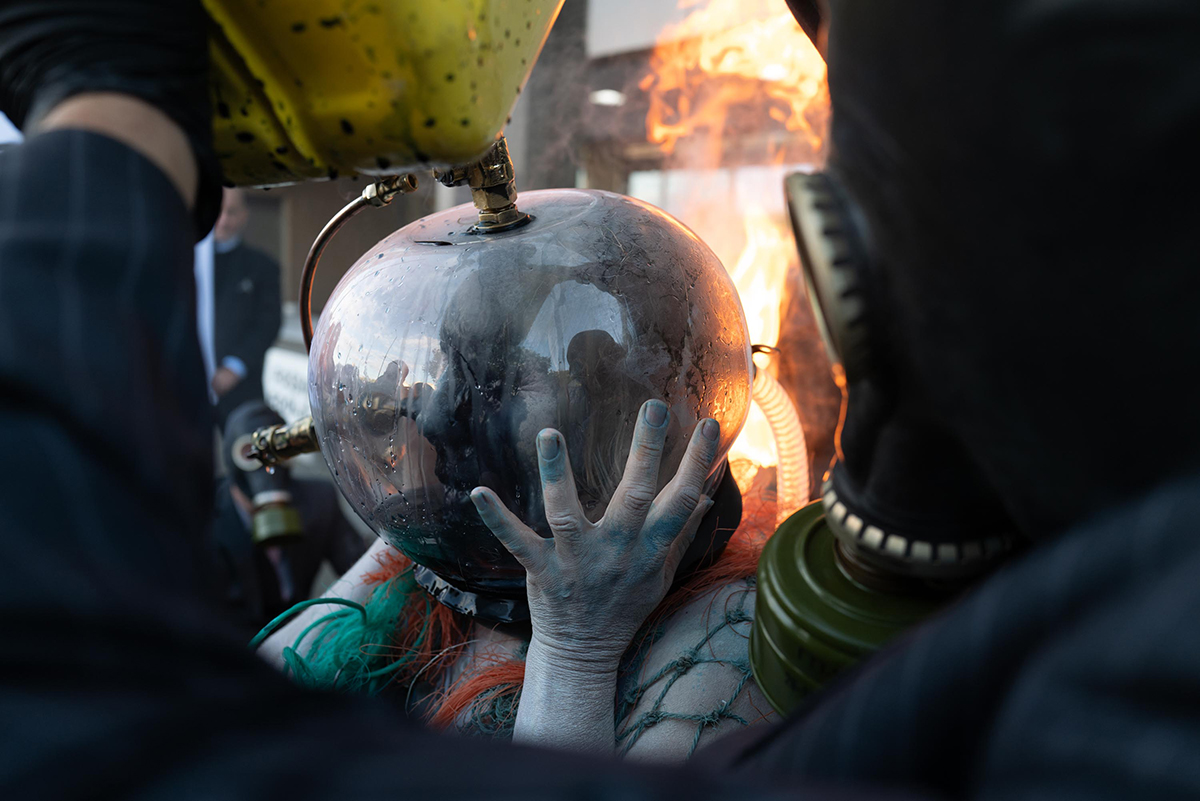
⬆️ Gaslighting por SEA-LNG é enganador e potencialmente ilegal para os membros, dadas as recentes regras da FCA que exigem os serviços são descritos com exatidão. Foto João Daniel Pereira.
Ao serem membros de SEA-LNG empresas como a Shell LNG, a Lloyd's Register e a Maersk estão a fazer "gaslighting" ao mesmo tempo que fazem declarações de sustentabilidade. Isto pode estar a violar as suas responsabilidades legais aos acionistas e correm o risco de serem alvo de litígios se esses riscos materiais, incluindo o risco de litígio, não estiverem devidamente reflectidos nas suas contas auditadas. Da mesma forma, agências de notação de crédito que não conseguem detetar este "greenwashing" também não estão a fornecer leituras de sustentabilidade precisas aos seus subscritores no sector financeiro.
Para não falar de qualquer falha nas responsabilidades éticas para com as partes interessadas mais alargadas, para evitar o colapso do clima, da natureza e da sociedade através do metano fugitivo e das emissões de carbono fóssil resultantes do GNL. Longe de ser limpo, o GNL é um dos combustíveis mais sujos que existe. Apresentá-lo como um combustível limpo é uma mentira tecnológica.
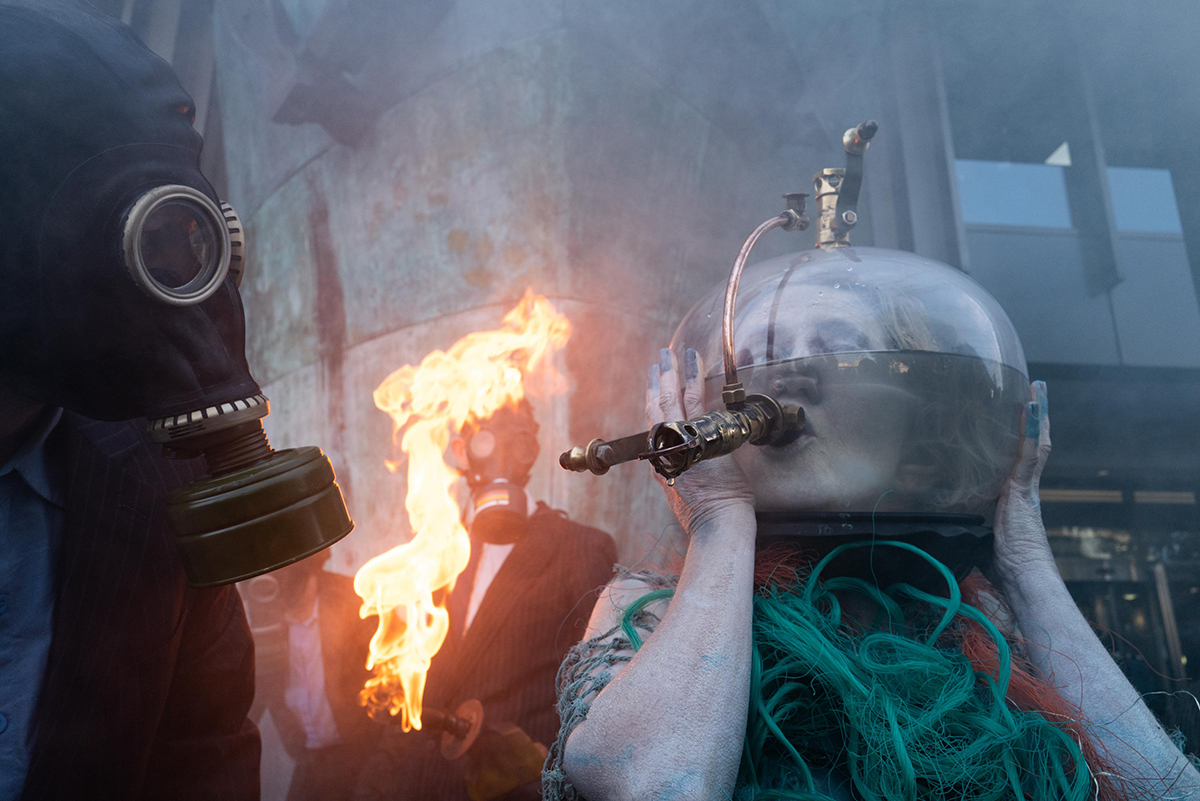
⬆️ A Deusa do Mar dá um último suspiro antes de sucumbir à mistura tóxica de GNL fóssil e biológico. Foto João Daniel Pereira.
Gás Natural Liquefeito (GNL) - os factos
O GNL é um combustível fóssil que, quando extraído, transportado e queimado como combustível marítimo, derrama metano para a atmosfera - um perigoso gás de aquecimento global que está acabado 80-vezes mais aquecimento climático a curto prazo do que o dióxido de carbono.
O Painel Intergovernamental sobre Alterações Climáticas (IPCC) da ONU identificado cortes rápidos das emissões de metano como uma das principais prioridades, a fim de limitar o aquecimento global a cerca de 1,5°C o mais próximo possível. Os IPCC's último relatório A concentração na mitigação do clima torna claro que o gás fóssil sob a forma de GNL não é uma solução para a descarbonização da navegação.
Contrariamente ao que a ciência climática exige, as empresas de transporte marítimo e portuário têm avançado a todo o vapor na direção errada, a investir fortemente em GNL fóssil, alegando que o combustível irá reduzir os seus impactos ambientais e a poluição climática. Existem actualmente mais de 785 novos navios de carga encomendados a nível mundial, com mais de 400 a serem construídos para funcionar com GNL fóssil.
Queimar mais GNL fóssil a bordo das embarcações é um desastre na construção do nosso planeta. Só iria aumentar as emissões de metano das naves, que já rosa até 150% entre 2012 e 2018, de acordo com a Organização Marítima Internacional das Nações Unidas (OMI).
As emissões de metano também diminuem a qualidade do ar e o aumento da procura de GNL - incluindo no sector marítimo - conduz a impactos adversos em terra, como a poluição da água potável, a redução da produção agrícola e o aumento das taxas de mortalidade prematura.
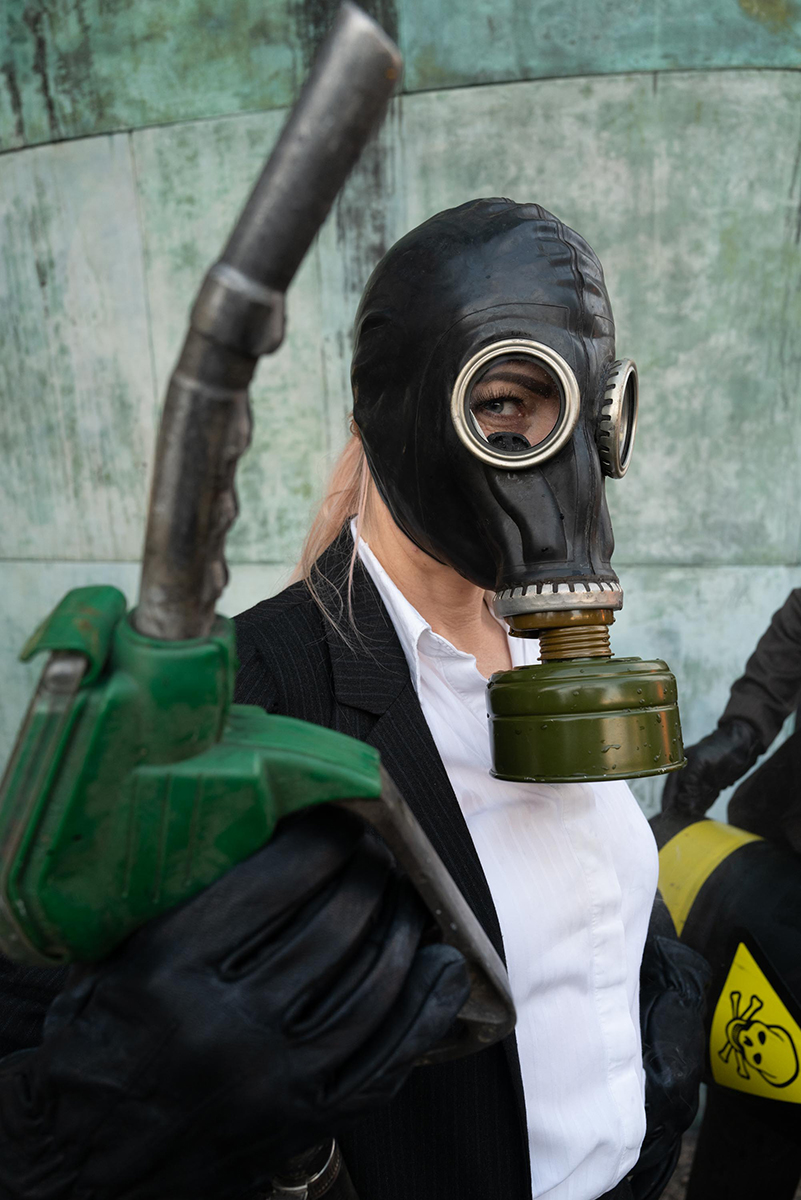
⬆️ Um executivo de gás disfarçado da Shell LNG demonstra como As chamas de GNL acontecem (a toda a hora) com uma bomba de óleo. Foto João Daniel Pereira.
Precisamos de regulamentos rigorosos sobre o metano na OMI
De acordo com o IPCC (AR6)Para que a UE possa fazer face à emergência climática e aos seus impactos devastadores sobre as pessoas, é necessário combater urgentemente as emissões de metano a curto prazo. Os proponentes do GNL estão a iludir os decisores políticos sobre a verdadeira dimensão dos impactos do GNL no clima e na saúde, ao mesmo tempo que põem em risco um futuro habitável neste planeta.
A Organização Marítima Internacional é o organismo das Nações Unidas que regula o transporte marítimo internacional. Atualmente, não existe regulamentação internacional específica para as emissões de metano dos navios.
Apelo à ação na OMI:
O GNL é um combustível fóssil que tem um impacto negativo sobre as pessoas, o ambiente e o clima em todas as fases do seu ciclo de vida.
Exigimos:
1. Os Estados-Membros da OMI reconhecem este facto e deixam de dar ouvidos à SEA LNG lobistas.
2. Todas as empresas envolvidas na promoção do GNL são analisadas para determinar se tal constitui uma violação dos seus objectivos de sustentabilidade ambiental.
3. A OMI para promover a eficiência e a utilização de embarcações à vela e eléctricas incentivando a adesão ao sector do transporte marítimo, capacitando e melhorando as competências dos trabalhadores e introduzindo rotas marítimas mais justas.
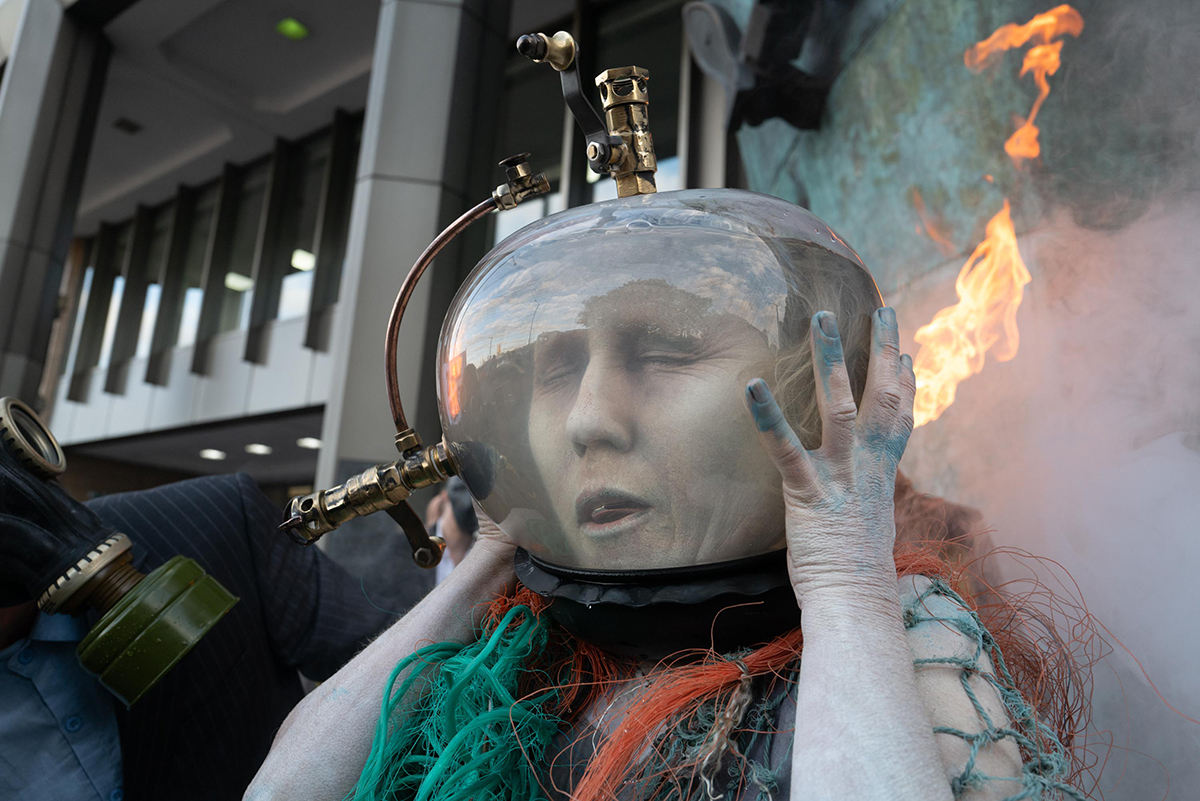

⬆️ O mundo está a morrer diante dos nossos olhos. Foto João Daniel Pereira.
1. Ao contrário do SEA-LNG, não mentimos sobre o que fazemos. Não utilizámos GNL para afogar a Deusa do Mar - isso seria um homicídio. Em vez disso, usámos água inofensiva.